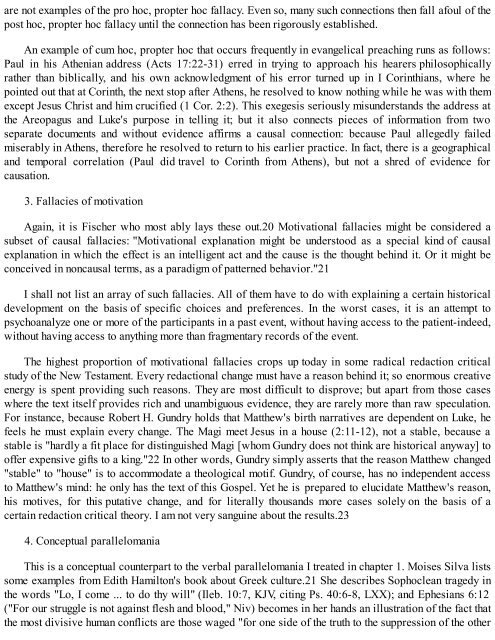Exegetical Fallacies - D. A. Carson
Exegetical Fallacies - D. A. Carson
Exegetical Fallacies - D. A. Carson
You also want an ePaper? Increase the reach of your titles
YUMPU automatically turns print PDFs into web optimized ePapers that Google loves.
are not examples of the pro hoc, propter hoc fallacy. Even so, many such connections then fall afoul of the<br />
post hoc, propter hoc fallacy until the connection has been rigorously established.<br />
An example of cum hoc, propter hoc that occurs frequently in evangelical preaching runs as follows:<br />
Paul in his Athenian address (Acts 17:22-31) erred in trying to approach his hearers philosophically<br />
rather than biblically, and his own acknowledgment of his error turned up in I Corinthians, where he<br />
pointed out that at Corinth, the next stop after Athens, he resolved to know nothing while he was with them<br />
except Jesus Christ and him crucified (1 Cor. 2:2). This exegesis seriously misunderstands the address at<br />
the Areopagus and Luke's purpose in telling it; but it also connects pieces of information from two<br />
separate documents and without evidence affirms a causal connection: because Paul allegedly failed<br />
miserably in Athens, therefore he resolved to return to his earlier practice. In fact, there is a geographical<br />
and temporal correlation (Paul did travel to Corinth from Athens), but not a shred of evidence for<br />
causation.<br />
3. <strong>Fallacies</strong> of motivation<br />
Again, it is Fischer who most ably lays these out.20 Motivational fallacies might be considered a<br />
subset of causal fallacies: "Motivational explanation might be understood as a special kind of causal<br />
explanation in which the effect is an intelligent act and the cause is the thought behind it. Or it might be<br />
conceived in noncausal terms, as a paradigm of patterned behavior."21<br />
I shall not list an array of such fallacies. All of them have to do with explaining a certain historical<br />
development on the basis of specific choices and preferences. In the worst cases, it is an attempt to<br />
psychoanalyze one or more of the participants in a past event, without having access to the patient-indeed,<br />
without having access to anything more than fragmentary records of the event.<br />
The highest proportion of motivational fallacies crops up today in some radical redaction critical<br />
study of the New Testament. Every redactional change must have a reason behind it; so enormous creative<br />
energy is spent providing such reasons. They are most difficult to disprove; but apart from those cases<br />
where the text itself provides rich and unambiguous evidence, they are rarely more than raw speculation.<br />
For instance, because Robert H. Gundry holds that Matthew's birth narratives are dependent on Luke, he<br />
feels he must explain every change. The Magi meet Jesus in a house (2:11-12), not a stable, because a<br />
stable is "hardly a fit place for distinguished Magi [whom Gundry does not think are historical anyway] to<br />
offer expensive gifts to a king."22 In other words, Gundry simply asserts that the reason Matthew changed<br />
"stable" to "house" is to accommodate a theological motif. Gundry, of course, has no independent access<br />
to Matthew's mind: he only has the text of this Gospel. Yet he is prepared to elucidate Matthew's reason,<br />
his motives, for this putative change, and for literally thousands more cases solely on the basis of a<br />
certain redaction critical theory. I am not very sanguine about the results.23<br />
4. Conceptual parallelomania<br />
This is a conceptual counterpart to the verbal parallelomania I treated in chapter 1. Moises Silva lists<br />
some examples from Edith Hamilton's book about Greek culture.21 She describes Sophoclean tragedy in<br />
the words "Lo, I come ... to do thy will" (Ileb. 10:7, KJV, citing Ps. 40:6-8, LXX); and Ephesians 6:12<br />
("For our struggle is not against flesh and blood," Niv) becomes in her hands an illustration of the fact that<br />
the most divisive human conflicts are those waged "for one side of the truth to the suppression of the other



